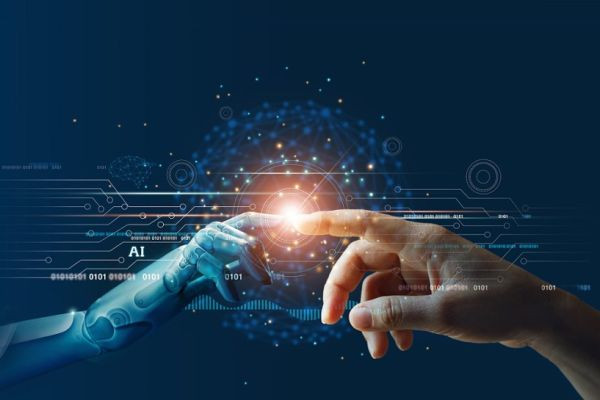Introduction
Artificial Intelligence (AI) has emerged as a revolutionary force, significantly transforming various aspects of human living. As we embark on this journey into the future, the profound impact of AI becomes increasingly evident. This thought-provoking article delves into the changes brought about by AI, the possibilities it unlocks, the challenges it poses, and how it is shaping the world we live in.
The Transformational Impact
The advent of AI has ushered in a new era of innovation, driving rapid changes in industries and societies alike. From healthcare and education to finance and transportation, AI is disrupting traditional systems and processes. Automation and machine learning have become cornerstones of this transformational impact, leading to increased efficiency, productivity, and accuracy in various domains.
Human Living and AI
AI's influence on human living is multifaceted. In healthcare, AI-powered diagnostic tools aid in early disease detection, enabling timely treatment and saving lives. Educational institutions leverage AI for personalized learning experiences, catering to individual needs and learning styles. Furthermore, AI is enhancing workplace dynamics, empowering employees with data-driven insights and freeing them from mundane tasks, allowing them to focus on creativity and critical thinking.
The Future of AI
Looking ahead, the future of AI holds limitless possibilities. The potential to tackle complex global challenges, such as climate change and poverty, through AI-driven solutions is both promising and inspiring. However, the future also presents challenges, including ethical considerations, data privacy, and the potential displacement of certain job sectors due to automation.
Shaping the World
AI's transformative potential extends beyond individual lives; it has the power to shape the world as a whole. Governments and policymakers must adopt a proactive approach to regulate AI technologies while fostering innovation and research. Collaborative efforts between industry leaders, researchers, and policymakers are crucial to harness AI's potential for the collective benefit of humanity.
Embracing AI Responsibly
As AI becomes increasingly pervasive, it is vital to embrace it responsibly. Ensuring transparency and fairness in AI algorithms and decision-making processes is essential to build trust among users. Striking the right balance between AI autonomy and human control is key to avoiding unintended consequences and maintaining ethical standards.
AI in Healthcare
Healthcare is one of the most important industries where AI is having a positive effect. Artificial intelligence (AI) systems examine enormous volumes of medical data to make precise diagnoses and enhance patient outcomes, from early disease diagnosis to personalised treatment strategies. Healthcare could become more accessible and effective with the use of AI-powered medical equipment, virtual nurses, and telemedicine systems, especially in distant areas.
Transforming Transportation
With the advent of autonomous vehicles and self-driving cars, AI is poised to transform the transportation industry. These developments promise to improve traffic flow, lessen congestion, and expand mobility for those with disabilities or restricted transportation options. Intelligent, effective urban mobility solutions are another goal of the integration of AI into public transit systems.
Boosting Education
The way we learn is changing thanks to AI. Intelligent tutoring programmes can adjust to different learning preferences, assisting pupils in better understanding subjects. AI-powered educational platforms analyse data to offer insightful analyses of student performance, empowering teachers to customise their pedagogical approaches. Additionally, virtual classrooms and content creation powered by AI present fresh opportunities for interactive and personalised learning.
Revolutionizing Industries
All industries are changing as a result of AI. Businesses are using AI to streamline operations, optimise processes, and make data-driven choices across a variety of industries, including manufacturing, agriculture, banking, and retail. Intelligent robotics and automation are boosting output and lowering human error, which is fueling major economic expansion and employment creation.
Enhancing Customer Experience
Customer experiences are improving in personalization and seamlessness in the age of AI. By offering real-time assistance and effectively handling inquiries, AI-powered chatbots and virtual assistants are revolutionising customer service. Companies can better understand client preferences thanks to advanced data analytics, which results in better products and services.
The Ethical Dimension
Ethical questions arise as AI is used more frequently in daily life. To enable ethical AI adoption, concerns including data privacy, algorithmic bias, and AI's effect on jobs must be properly considered. Building trust in AI systems depends on finding a balance between ethical considerations and technological advancement.
One of the most critical aspects of the transformational impact of AI is the ethical dimension. As AI systems become more sophisticated, concerns regarding bias, discrimination, and the potential misuse of data have come to the forefront. Striking the right balance between innovation and ensuring ethical guidelines is a pressing challenge. It necessitates the establishment of robust regulatory frameworks and industry standards to safeguard individual rights and societal values.
Unlocking New Possibilities
AI has the ability to open previously unimaginable doors. AI-driven technology can speed up scientific discoveries and find solutions to difficult global problems, from combating climate change to exploring space. Research and development have new avenues to explore thanks to AI's capacity to process enormous datasets and find patterns.
AI and Human-Machine Collaboration
While AI continues to advance, it is essential to recognize that human intelligence and creativity remain unparalleled. The future of AI lies in harmonious human-machine collaboration. By leveraging AI as a tool to augment human capabilities, rather than replacing them, we can create a synergy that unleashes unprecedented potential. Emphasizing a cooperative approach can lead to groundbreaking discoveries and solutions to global challenges.
Addressing Technological Bias
As AI algorithms learn from historical data, they can inadvertently perpetuate biases present in the data. Addressing technological bias requires vigilance and continual refinement of AI models to ensure fairness and inclusivity. Developers and researchers need to actively seek ways to mitigate bias and build AI systems that reflect the diverse perspectives and needs of humanity.
Cybersecurity Concerns
The rise of AI also brings forth new cybersecurity challenges. With AI being integrated into critical infrastructure and defense systems, safeguarding against potential AI-driven cyber threats becomes paramount. Robust cybersecurity measures, such as encryption and authentication protocols, must be implemented to protect against AI-powered cyberattacks.
Education and AI Literacy
As AI permeates various domains, the importance of AI literacy and education cannot be overstated. Empowering individuals with AI literacy equips them to make informed decisions, understand the implications of AI applications, and contribute to the responsible development of AI technologies.
Global Collaboration and Policy Frameworks
As AI's influence transcends national borders, international cooperation is vital to shape the future of AI responsibly. Collaborative efforts in sharing best practices, data, and research can accelerate AI advancements while ensuring a globally unified approach to ethical standards and regulations.
Conclusion
The transformational impact of AI on human living and the future is undeniable. From driving innovation to presenting ethical challenges, AI's potential to shape our world is both promising and complex. Embracing AI with a focus on ethical considerations, human-machine collaboration, and global cooperation will allow us to harness its potential responsibly. By working together to address challenges and seize opportunities, we can navigate this AI-powered future with optimism and create a world where technology empowers and enriches the lives of all humanity.









